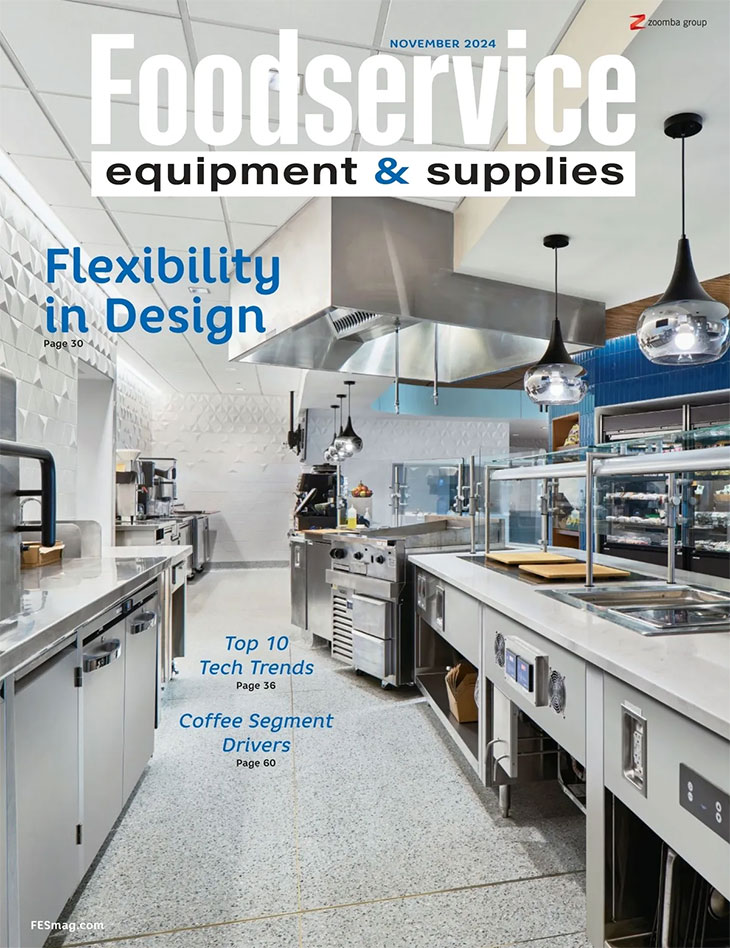Nancy Culotta, NSF International vice president for food safety product certification and consumer products, announced her plans to retire earlier this year.

Culotta joined NSF International in 1985 as a product certification field auditor and went on to become the general manager of NSF's Drinking Water and Wastewater programs. In 2000, she helped launch NSF's food safety auditing services with the acquisitions of the Cook & Thurber and Fresh Check supermarket food safety businesses. In 2004, Culotta was promoted to vice president of retail food safety and in 2007 took the assignment as vice president, food safety product certification, with responsibility for NSF's Foodservice Equipment, Nonfood Compounds and Bottled Water Certification programs.
In this article the highly regarded Culotta discusses with FE&S her 25 years working with NSF International, the foodservice industry and more.
FE&S: Is the industry more in tune with food safety and sanitation issues than it was when you first joined NSF 25 years ago?
NC: Absolutely, food safety is now top of mind. Food safety is a shared responsibility and best achieved through partnerships and collaborations between consumers, regulators, manufacturers and retailers.
In today's global environment, food safety is more important than ever. Safeguarding the food supply is a complex and challenging responsibility. As a result, many of the world's largest food companies, retailers and manufacturers have set higher food safety standards.
One way the food industry can demonstrate compliance with food safety standards and show continuous improvement in food safety management and operations is through certification. Product certification focuses on testing the product and inspecting the product (e.g. food equipment) and global food safety system certification, such as Safe Quality Food (SQF), focuses on the quality of the food safety system. Both certifications work together to improve safety and quality efforts. Certification to national food equipment standards and GFSI (Global Food Safety Initiative)-benchmarked standards provides the ideal product and system protection.
Many leading global retail and foodservice companies now require certification of their suppliers against these Global Food Safety Initiative (GFSI)-benchmarked standards to help strengthen food safety practices. It's important that food equipment manufacturers make sure the products they sell into foodservice comply with HACCP programs and industry best practices.
FE&S: What accomplishment makes you most proud?
NC: One accomplishment that I am most proud of is developing water filtration specifications for foodservice beverage dispensers to ensure consistent product quality. With Cryptosporidium outbreaks occurring in the 1990s, the foodservice industry became increasingly concerned about fountain dispensers' water quality. Working closely with regulators and industry leaders, NSF developed American national drinking water filtration standards for fountain dispensers to assure consistent quality and public health protection. These new high-flow filter requirements were based on NSF/ANSI 53: Drinking Water Treatment Units - Health Effects to address point-of-use (POU) and point-of-entry (POE) systems designed to help reduce specific health-related contaminants, such as Cryptosporidium, Giardia, lead, volatile organic chemicals (VOCs), MTBE (methyl tertiary-butyl ether), that may be present in public or private drinking water.
FE&S: What excites you most about the future of NSF and the foodservice industry?
NC: I had an opportunity to work with others in making a very real impact on public health. This has allowed me to meet exceptional professionals, both at NSF and throughout many industry and stakeholder organizations. I will always value the long-standing relationships I've developed along the way with organizations such as the National Environmental Health Association, North American Food Equipment Manufacturers Association, Water Quality Association, and Institute of Food Technologists, and look forward to working with the food industry and regulators after retiring from NSF to continue to protect and improve public health.
The globalization of consistent product quality standards also is very exciting. NSF was founded in 1944 to help develop consistent national standards for foodservice equipment and now we are doing this on a global scale.
I really enjoy helping organizations worldwide spec out certified equipment to assist with risk management and brand protection efforts as well as execute food safety best practices.
Last year, I launched the NSF Home Product Certification program, bringing NSF's food safety expertise to the world of household kitchen appliances and other home products such as food storage containers, cookware and bakeware. The new testing and certification program evaluates the quality, performance and material safety of these products and has great potential in the years to come.
FE&S: If you could leave the industry with one piece of advice, what would that be?
NC: My advice would be to continue to be proactive and innovative. Be sure to talk to regulators that oversee plan review and users to make sure their food safety and efficiency needs are being met. It's important that manufacturers not only comply with current food safety regulations but that they continue to train their workforce and implement best practices to ensure food safety remains a top priority in the years to come.




